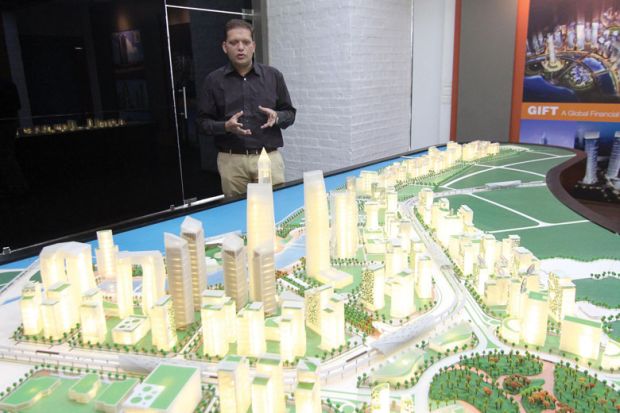A city under construction in the west Indian state of Gujarat could hold important clues about how the country’s plan to attract top international universities to its shores might play out.
Rising from the banks of the Sabarmati River, the tall tower blocks of the Gujarat International Finance Tec-City (Gift City) are set inside a special economic zone, which allows institutions located there to skip the usual red tape required under Indian law.
In February, India’s finance minister, Nirmala Sitharaman, announced that “world-class foreign universities and institutions” would be allowed to set up shop in Gift City, teaching courses in financial management, fintech, science, technology, engineering and mathematics, largely free from domestic regulations.
Observers agreed that Gift City – the first of its kind in India – would be an important test bed for determining the shape of international involvement in India’s higher education sector.
Gujarat is favourably positioned as the home state of India’s prime minister, Narendra Modi, and a darling for government projects.
“The Gift City announcement is an opportunity to see how India might attract high-quality overseas foreign institutions,” said Amrita Sadarangani, executive director of the Gujarat Biotechnology University and a consultant at the University of Edinburgh.
Ms Sadarangani noted that “the way the opportunity is being positioned, foreign universities don’t really need a partner” to establish themselves in the city – a key difference from the current situation in India.
She said the set-up represented an acknowledgement by the government that it might need to grease the wheels to entice overseas institutions.
“They realised that an enabling regulatory framework is crucial to having foreign institutions in any format here – whether traditional [transnational education], joint campuses or degrees delivered overseas,” Ms Sadarangani said.
In another key difference, universities will be able to move into office towers rather than needing to build their own premises from the ground up, said Eldho Mathews, a deputy adviser in the Unit for International Cooperation at the National Institute of Educational Planning and Administration in New Delhi.
Currently, land acquisition is “the major headache” for private players in Indian higher education, with such institutions often needing a minimum of 100 hectares for a campus – an area that is impossible to carve out in densely populated cities and involves negotiating a bureaucratic labyrinth even in an optimal location.
But now, Mr Mathews said, international institutions could look instead to the model used by Harvard Business School, which offers a management programme partly in Mumbai along with its main Boston-based campus. Its Indian unit operates out of a high-rise building.
Yet even with fewer restrictions, the new city would not be a free-for-all, Mr Mathews cautioned.
“One thing is very clear,” he said. “The government seems to be very choosy in STEM subjects and probably wants to invite those institutions who are willing to offer programmes in selective subjects or areas.”
One “priority” for the government would be to select international institutions carefully to ensure that there would “not be any clash” with existing players in India’s domestic higher education sector, Mr Mathews said.
While Gift City is “just an experiment” so far, there is potential for far-reaching impacts, with more attempts sure to follow if international universities taste success.
“For them, this is a low-risk affair,” Mr Mathews said, adding that universities could start by offering “one or two programmes, and based on success of this they can think about expanding”.
Register to continue
Why register?
- Registration is free and only takes a moment
- Once registered, you can read 3 articles a month
- Sign up for our newsletter
Subscribe
Or subscribe for unlimited access to:
- Unlimited access to news, views, insights & reviews
- Digital editions
- Digital access to THE’s university and college rankings analysis
Already registered or a current subscriber? Login








